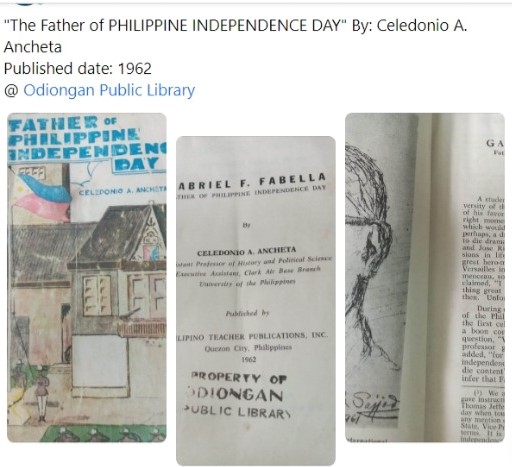By Chris
Antonette P. Pugay
Former President Diosdado D.
Macapagal issued Proclamation No. 28 endorsing to the Congress the urgency of
enacting a measure to fix June 12 as Philippine Independence Day. Two years
later, Republic Act No. 4166 proclaiming June 12 as Independence Day and July 4
as Philippine Republic Day was signed and approved by President Macapagal. This
surprised many who were accustomed to July 4 as the celebration of the
Philippine Independence, however, President Macapagal’s proclamation drew
overwhelming support from the public, civic organizations, professional
associations, and even political parties. While the former president received
praises for this act, the Filipinos should also recognize the person who
actually fathered the idea of June 12 as Philippine Independence Day – Gabriel
F. Fabella.
Gabriel F. Fabella was a known
lawyer, educator, and an assemblyman during his lifetime. He was born to Maximo
Fabella and Rafaela Fabrero on 18 March 1898 in Jones (formerly Banton),
Romblon. He finished his secondary course in the Manila High School (presently
known as Araullo High School) in 1916. Eventually he pursued his undergraduate
and graduate degrees in education at the University of the Philippines. He
obtained his law degree from the National Law College.
Fabella taught in various
schools like Capiz Intermediate School, Romblon High School, Tayabas High
School, and even in the College of Liberal Arts in the University of the
Philippines. For quite a while he worked as the editor of Bagong Iwag and
translated some of Shakespeare’s plays in Filipino. He had been very active in
the academe and eventually involved himself with politics by joining the Nacionalista-Democratico
Party. He served as member of the First National Assembly from 1935 to 1938
while fostering his historical advocacy by being active in the Philippine
Historical Association.
Bill filed in 1959
Fabella toyed with the
idea of changing the date of Philippine independence from July 4 to June 12 as
early as 1959. Eventually, he tried to seek the help of his constituents from
UP in order for his vision to come true. Also in the same year, the Philippine
Historical Association submitted a resolution sponsored by Fabella which was
the basis of Congressman Ramon Mitra’s bill seeking to adopt June 12 as the
independence day of the Philippines.
Apart from the
resolution, Fabella made sure he did his part by carrying his advocacy in his public
speeches and over the radio. He explained to the public the significance of
celebrating June 12 as the country’s independence day. This was the
content of his speeches in Mindoro, Cavite and Legaspi City. He also wrote an
article “June 12 or July 4?” that was published in the Sunday Times Magazine on
June 1960 and this stirred positive responses and support from the people.
His arguments and reasons embodied in the PHA
resolution in advocating June 12 to be the independence day were the following:
- First,
United States celebrates independence day every July 4, the day Americans
declared their independence not 3 September 1783 when Great Britain
recognized their liberty;
- Second,
if the Philippines celebrates its independence day every July 4, our
celebration would be dwarfed by the US celebration;
- Third,
June 12 was the most logical date since Filipinos were not actually
particular about fixing of dates, what we actually cared for is
independence itself;
- Fourth,
if the Philippines celebrates common independence day with USA, other
nations might believe that the Philippines is still a part of United
States.
As Filipinos celebrate
every twelfth of June as independence day, they should also remember that an
unpretentious person like Fabella undertook extraordinary task of changing the
date from July 4 to June 12.


No comments:
Post a Comment